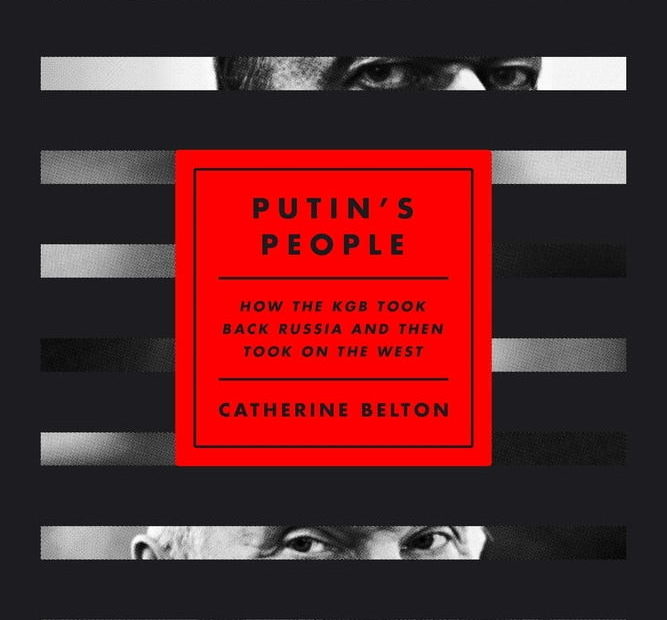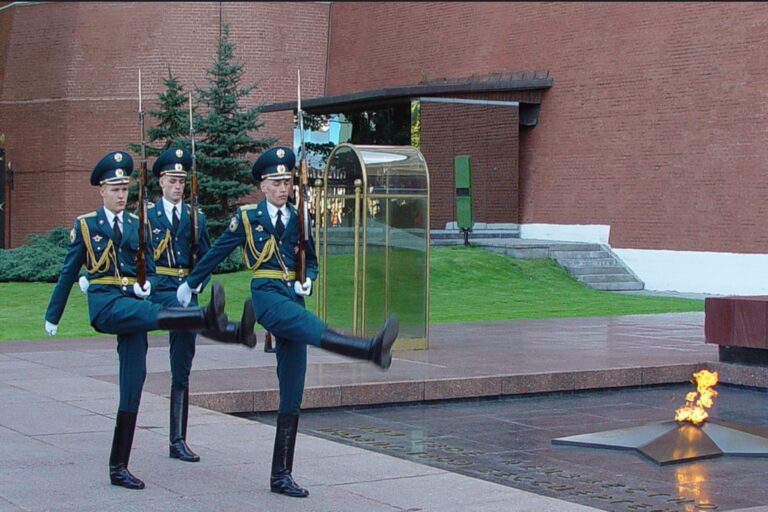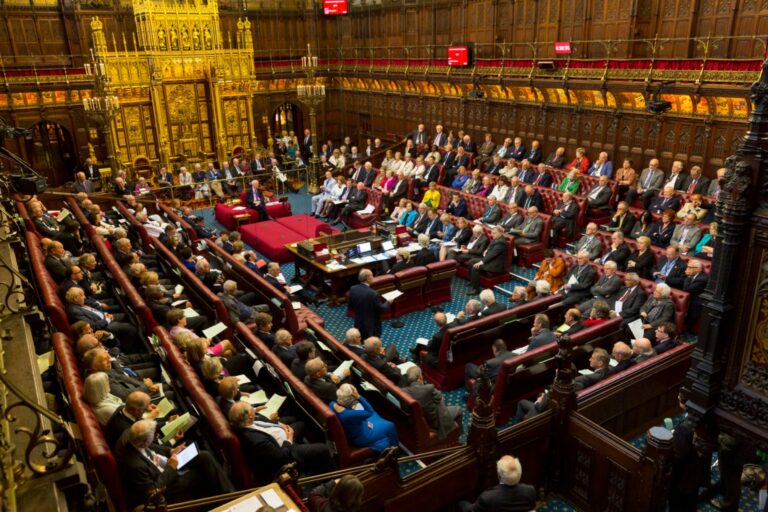Review of Catherine Belton, Putin’s People: How the KGB Took Back Russia and Then Took on the West (New York, New York: Farrar, Straus and Giroux, 2020).
Russia’s behavior on the international stage confounds analysts. In August and September, POLITICO featured dueling letters signed by Western and Ukrainian Russia policy experts, arguing different US foreign policy approaches.[1] At the core of the argument lies a difference of opinion about the nature of the Putin regime. One set of experts argued there is room for cooperation with Russia despite it being a rival. Their counterparts refuted this concept on the grounds the Putin regime was fundamentally antagonistic to the West. These letters demonstrate the lack of consensus among longtime Russia experts about the nature of the Putin regime. A determination of this question is vital for Western policymaking. Identifying the Putin regime’s operating principles is central to determining US foreign policy.
In her book, Putin’s People: How the KGB Took Back Russia and Then Took on the West, former British investigative journalist Catherine Belton offers her theory about the nature of Putin’s regime. She does so by narrating the rise of what she refers to as a KGB elite. This cohort endured despite the KGB’s demise and reconfiguration as a formal institution in the wake of the USSR’s collapse. This KGB elite includes Vladimir Putin. Although he is a prominent product and vessel of the KGB cabal, Putin is not its creator. Belton argues the KGB elite developed a strategy to capture the Russian state, a “KGB takeover of the [Russian] economy – and the country’s political and legal system.”[2] The Putin regime is the strategy’s desired outcome.
Once in command of the state, the KGB elite sought to “undermine and corrupt the institutions and democracies in the West.”[3] Such a theory has profound policy implications for the West generally and the United States specifically. If the theory is correct, then the West and the United States are facing an implacable Russian regime hellbent on confrontation. Belton argues “[the KGB men who dominate the Russian state] came from a world where the Cold War never really ended, where the only thing that mattered was restoring Russia’s geopolitical might” at the expense of the West and liberal democracy.[4] No amount of relationship resets could overcome such a reality. There is evidence Belton’s theory is being taken seriously. Her book was glowingly reviewed during an event at the Atlantic Council, a preeminent US think tank.[5] One of the POLITICO letters about US foreign policy towards Russia adheres to a theory similar to Belton’s.[6]
Therefore, assessing Belton’s theory is important. The first analytical lens to examine is the theory’s logic. Specifically, the claim of the KGB elite’s conspiracy to capture the state in order to continue the Cold War. An overview of Belton’s depiction of this capture is necessary. She argues it was made possible by the KGB’s power during Soviet times. This included access to financial resources used for foreign intelligence operations. By the 1980s, Belton claims these elites were “fully aware [their] monopoly on power was ever more precarious.”[7] Therefore, they undertook two endeavors. The first was amassing those financial resources and sending them outside of the USSR, “to create an ‘invisible economy’ for the [Communist] Party’s wealth.”[8] The second was starting to manage the economic transition away from a planned economy to a more capitalist one.[9] This transition was to help the USSR compete with the West, since the planned economy model was failing to do so. However, this transition took place as the USSR was imploding. Amid the tumult, Belton asserts the first breed of Russian oligarchs, men like Mikhail Khodrokovsky and Boris Bezerzovsky, were partly aided by the KGB elite. This aid was premised on the belief the KGB elites could control the oligarchs and their wealth. However, the wealthier the oligarchs grew during the 1990s, the less the KGB elites could control them. The KGB elites resented this loss of control. Ultimately, they took their revenge on the oligarchs who stood up to them, in particular Khodrokovsky and Bezerzovsky.[10] The former ended up in a Siberian prison, and the latter died in exile. This revenge took place once Putin was firmly in power.
Belton’s logic appears most tenuous when it comes to evaluating the animating drive of the KGB elite. First, we must analyze corruption in the Putin regime. Belton describes various state corruption schemes as a way to form “parallel budgets, far removed from any democratic oversight” to boost “authoritarian control at home” and to “undermine institutions in the West.”[11] Justified as compensation for patriotic service,[12] self-enrichment is secondary to the goal of restoring Russian geopolitical strength. Belton contends the KGB elite view themselves as the Russian vanguard. Yet if their goal was to resume the competition against the West and ultimately win by following a more capitalist model, the results of their actions are less than stellar. Judging by GDP (admittedly an imperfect measure), Russia has the eleventh largest economy in the world,[13] lagging behind Brazil, Canada, and Italy. Its population is decreasing, losing on average 25,000 people a year.[14] Such losses affect workforce productivity and economic vitality prospects. Further, the economy lacks technological and digital innovation. Experts consider this an essential metric of economic growth.[15]Instead, the Russian economy relies primarily on natural resources.
It is undeniable the Russian economy and state capacity improved after the chaotic 1990s. However, why would the KGB elites allow state corruption, which inevitably weakens the very state they control? By weakening the Russian state, the KGB elites are damaging their chances at a competitive edge over the West. Belton failed to address this reality in her book. Moreover, undermining and competing with the West appear conflated. Is the KGB elite’s goal to undermine the West in order to improve its competitive advantage? Or is undermining without competing the goal? Additionally, Belton did not consider another explanation for the endemic state corruption. The KGB elite might want to undermine and/or compete with the West, but that’s not the animating drive. Instead, it’s an excuse for stealing. Such a distinction is not trivial: if the KGB elite prioritizes self-enrichment as the top goal, then the Putin regime is not automatically driven to undermine the West. Numerous authoritarian regimes feed off corruption. However, they aren’t necessarily ideologically predisposed to attack the foundations of liberal democracy.
This examination leads us to another analytical lens: sourcing. As is proper for a former investigative journalist, Belton relies on anonymous sources close to the events she recounts. There are also some primary sources. For example, Sergei Kolesnikov, a former KGB elite financier, fled to the West with documentation of corruption. Kolesnikov’s documents detailed elaborate financial schemes to siphon state funds for the benefit of the elite.[16] While it is clear the elites, including Putin, personally enriched themselves from such schemes, Belton infers this siphoning was connected to subversive operations against the West. Yet she doesn’t actually demonstrate how it is connected. We must be mindful of this source materials’ limitation in demonstrating certain arguments. Thus, extrapolations based on a limited data set should be narrow. At a minimum, there needs to be more evidence demonstrating the state corruption directed by the KGB elite is primarily driven by ideology.
Further, when it comes to the on-the-record sources, we must evaluate them carefully. The most prominent of these is Sergei Pugachev. His index references cover more than half a page, far more than any other on-the-record sources.[17] Belton recognizes Pugachev as a controversial figure. He was a wealthy banker and éminence grise during the Yeltsin government who allegedly pulled various levels of power despite having no official title. Pugachev claims to be responsible for Putin’s Kremlin ascendency. He also is accused of massive bank fraud. Pugachev fled Russia over these allegations, claiming he was being set up by Putin after the two fell out. He sought refuge in London but then also fled from there, as his British legal battles against the Kremlin were not successful. Belton argued the Kremlin is so adept at playing the British legal system that it cornered Pugachev. While not impossible, such a manipulation of the courts by the Kremlin seems far-fetched. Great Britain is host to many critics of the Kremlin. If the Kremlin was so powerful in manipulating the British legal system, why not silence all these critics using British courts? One possible explanation for Pugachev’s legal woes is his guilt, as suggested by a BBC report.[18] We should be aware of the fact that while Belton states Pugachev is flawed, the overreliance on his memory and interpretation of events is still concerning. It doesn’t mean Pugachev’s accounts should be dismissed. Instead, where possible, his claims should be fact-checked. If it is not feasible to check the validity of his claims, Belton could have at the very least noted Pugachev’s claims were unsupported by evidence.
In conclusion, Putin’s People provides for vivid depictions the individuals surrounding Putin, the described KGB elite who are in total control of the state. More importantly, it raises crucial questions about the nature of the Putin regime. The centrality of corruption, the prevalence of former KGB operatives in positions of political and economic power, and the anti-Western bend of the Putin regime are all highlighted by Belton. However, Belton’s theory of the Putin regime’s nature should be analyzed critically by readers. More evidence is needed before we can properly assess them. It’s possible Belton is right. The Putin regime could be constitutionally geared towards confrontation with the West. Despite its economic weaknesses, Russia has strong military and nuclear capacity. Its nuclear arsenal rivals the United States’ own nuclear forces.[19] It projects its military in multiple theatres. Russian interference in Western political affairs continues. The Putin regime uses chemical weapons against opponents, in defiance of international norms. Explaining these behaviors as stemming from unyielding anti-Western ideology narrows Western foreign policy options. Such options range from ignoring to outright confrontation. Given the consequences and costs posed by these options, it is important for current and future policymakers to properly analyze the true nature of the Putin regime. Belton’s engrossing account helps readers think about this analysis. Yet we need to critically evaluate the claims she made and the questions she raised before drawing any final conclusions.
[1] Rose Gottemoeller et al, “It’s Time to Rethink Our Russia Policy,” POLITICO, August 5, 2020, https://www.politico.com/news/magazine/2020/08/05/open-letter-russia-policy-391434; David J. Kramer etal, “No, Now Is Not the Times for Another Russia Reset,” POLITICO, August 11, 2020, https://www.politico.com/news/magazine/2020/08/11/russia-reset-response-open-letter-393176; Rose Gottemoeller et al, “Why We Still Need to Rethink Russia Policy: A Rebuttal,” POLITICO, September, 25, 2020, https://www.politico.com/news/magazine/2020/09/25/russia-open-letters-rebuttal-421546.
[2] Catherine Belton, Putin’s People: How the KGB Took Back Russia and Then Took on the West (New York, New York: Farrar, Straus and Giroux, 2020), 15
[3] Belton, 15
[4] Belton, 366
[5] “Putin’s People: How the KGB Took Back Russia,” the Atlantic Council, June 30, 2020, https://www.atlanticcouncil.org/event/putins-people-how-the-kgb-took-back-russia/.
[6] Rose Gottemoeller et al, “Why We Still Need to Rethink Russia Policy: A Rebuttal,” POLITICO, September, 25, 2020, https://www.politico.com/news/magazine/2020/08/11/russia-reset-response-open-letter-393176
[7] Belton, Putin’s People, 58
[8] Belton, 58
[9] Belton, 66
[10] Belton, 240
[11] Belton, 402
[12] Belton, 193
[13] “The Top 20 Economies in the World,” Investopedia, last modified March 18, 2020, https://www.investopedia.com/insights/worlds-top-economies/#:~:text=Russia%2C%20the%20largest%20country%20on,nominal%20GDP%20of%20%241.63%20trillion.&text=The%20economy%20contracted%20by%200.2,during%202018%20and%202019%2C%20respectively
[14] Pat Evans, “13 mind-blowing facts about Russia’s economy,” Business Insider, April 16, 2019, https://markets.businessinsider.com/news/stocks/russia-economy-facts-2019-4-1028116037
[15] Ricardo Hausmann and José Domínguez, “Knowledge, Technology and Complexity in Economic Growth,” Harvard Real Colegio Complutense, https://rcc.harvard.edu/knowledge-technology-and-complexity-economic-growth#:~:text=In%20economics%2C%20it%20is%20widely,is%20what%20prosperity%20depends%20on.
[16] Belton, 312-5
[17] Belton, 613
[18] Ahmen Khawaja, “Life with a Russian billionaire: money and death threats,” BBC, April 7, 2020, https://www.bbc.com/news/stories-52091928
[19] Hans M. Kristensen and Matt Korda, “Status of World Nuclear Forces,” Federation of American Scientists, September 2020, https://fas.org/issues/nuclear-weapons/status-world-nuclear-forces/



